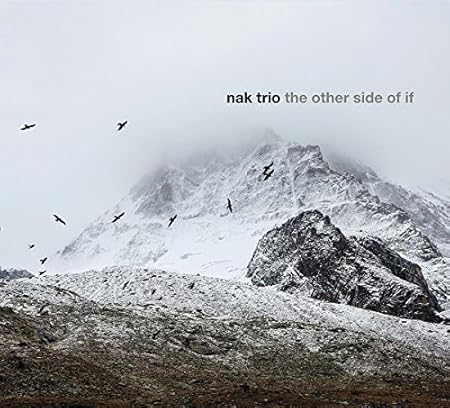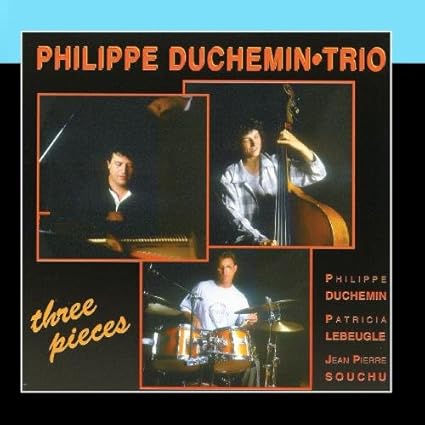Nachtfahrten

By John Fordham/The Guardian
The imaginative and fluently skilful German pianist Michael Wollny covered music by Alban Berg, Edgard Varése and the Flaming Lips on his last album, but the 14 tracks here are mostly his own work or that of his superb trio with Christian Weber (bass) and Eric Schaefer (drums) – save for the odd excursion into the Twin Peaks soundtrack or the music of medieval master Guillaume de Machaut, and a piece by Wollny’s former teacher Chris Beier, whose piano-playing was undermined by a neurological condition. Nachtfahrten – “night journeys” – is a more shaded, melodically sparing venture than its predecessor Weltentraum, with Beier’s enforced retreat into essences and understatement a key inspiration, but its layering and fine details are just as fascinating. Schaefer’s Motette No 1 springs ingenious improv from a rocking vamp, Beier’s White Moon is a beautiful melody enhanced by a steady, Mehldau-like manner. Schaefer’s Ellen has the kind of pop-ballad feel that Esbjörn Svensson might have given it and Au Clair de la Lune wanders wistfully amid pinging cymbal sounds and sparse drum rolls. They are one of the world’s great jazz-driven piano trios, and Nachtfahrten takes nothing away from this assessment.
John Taylor
2081

By CamJazz
“A family project” is how Alex Taylor, singer-songwriter as well as John’s son, labels the English pianist’s latest album. And that is exactly what it is, considering that John, who wrote the music, and Alex, who wrote and sang the lyrics, are joined by Leo Taylor on drums. Oren Marshall on tuba, whose surname is not Taylor but who is most assuredly very close to the Taylor family, completes the quartet. Together they recorded the album entitled “2081” drawing inspiration from Kurt Vonnegut’s short story “Harrison Bergeron”, published in 1961. John Taylor was commissioned to write the music to this album by BBC Radio 3 for the Cheltenham Jazz Festival. Originally written for octet, it was then readapted for the “2081” quartet. Alex explains: “Vonnegut’s story depicts a dystopian future in which everyone is equal. Nobody is allowed to be smarter, better looking or more physically able than anyone else. Those individuals who are gifted with intellect, talent and so on are made to bear ‘handicaps’”. At times, John Taylor’s musical realm is reassuring and consistent with his own standards, while, at other times, it conveys the mysterious, unsettling future depicted by Vonnegut, by pursuing a hybrid sound, mingling jazz, pop and the soundtrack mood. This pursuit definitely benefits from the sonic scenarios opened by Marshall’s tuba, as well as the Leo’s drumming style (already launched on a brilliant career on the indie-rock scene with his band The Invisible), who very often introduces modern, offbeat hypnotic rhythms here. Alex further explains: “I wanted to be able to tell a love story within the world Vonnegut created, from a standpoint external to the novella but very much in that theme”.
Personnel:
John Taylor ( Piano ); Oren Marshall ( Tuba ); Alex Taylor ( Vocal ); Leo Taylor ( Drums )
Nak Trio
The Other Side Of If

By Challenge
"Jazz made in Poland" has been considered a seal of quality since the 1960s. Well-known musicians as Zbigniew Namysłowski, Tomasz Stańko, Michał Urbaniak, Krzysztof Komeda, Zbigniew Seifert, Adam Makowicz, Jan Wróblewski, Urszula Dudziak, Leszek Zadlo and Vitold Rek shaped an unmistakable style that lifts the substance of American swing with the yearning of the Eastern European bloc countries for freedom and adventure to a high quality, exciting common denominator. Admittedly, the explosive, sparkling atmosphere of Polish catacomb and underground jazz belongs to past at the latest since the political upheavals in Europe at the end of the 1980s. Today, it is above all pianists who set the tone of the cultural image of the country. Marcin Wasilewski and Leszek Możdżer are getting worldwide recognition with their diverse projects as creators of a new musical language. It is quite possible that three young Polish musicians will be mentioned in one breath with them in the future: Dominik Wania (piano), Jacek
Kochan (drums) and Michał Kapczuk (bass) have joined forces under the cryptic slogan "NAK Trio" to create a community of interest exceptional in every way.
You can consider these names as quite representative of the unconventional approach of the combo, which runs like a thread through all their actions: not straight ahead, but always a bit out-of-the-box. NAK does not stand for the initial letter of the last name of the protagonists as in other formations, but instead for the final letter: KochaN– WaniA – KapczuK. It continues consistently in this direction with the title of their debut album "The Other Side Of If". Although all of this is probably a bit abstract, indefinable, perhaps somewhat philosophical, drummer, composer and producer Jacek Kochan apologizes smiling. "If you think about the exact meaning of the word 'if', then a few questions first arise in your mind in any language. 'What if?' 'What would happen if?' Perhaps 'Would it be better or worse if?' Since the answer always remains unresolved and consequently the symbolism of the little word 'if', there is a certain fascination, something mysterious, with respect to everything." In exactly the same way, Jacek Kochan, Dominik Wania and Michał Kapczuk want to enchant their fans. Far from the classic A-A-B-A jazz pattern, the seven original compositions are based more on two masters of classical modernism the 20th century, the Hungarian Béla Bartók (1881-1945) and his Polish compatriot Witold Lutosławski (1913-1994). "We consider it important that all four instruments are in the forefront," Kochan explained. Excuse me, in a trio? "Simple," laughs the primus inter pares (the first among equals) of NAK trio. "Bass, drums, and the left and the
right hand of the piano player. The reason is that Dominik has developed a technique with his left hand that is very unique and differs clearly from that of other jazz pianists. The melodies and harmonies have more of a chromatic structure. I hope that this does not frighten off jazz aficionados too much, because it actually still is jazz. Our jazz. However, fans of classical music might also like it!"
Philippe Duchemin Trio
Three Pieces

Personnel:
Piano : Philippe Duchemin; Acoustic bass : Patricia Lebeugle; Drums : Jean Pierre Souchu
Tracks:
1- Take bach (4'44")
2- Honey (6'23")
3- fond brun (7'15")
4- Bernie's Tune (5'51")
5- Fumet (5'34")
6- Quand je monte chez toi (7'05")
7- What is this thing called love (5'55")
8- Lucy in the sky with diamond (6'01")
9- Tea for two (5'18")